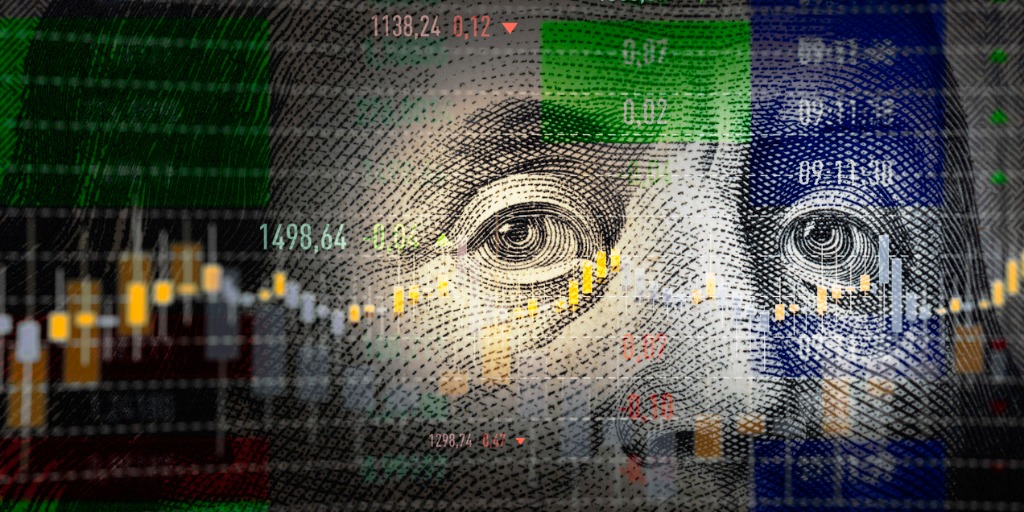Financial Markets 101: Different Types and What Shapes the Market
Financial markets affect all our lives, but many of us do not fully understand them.
What are the different types of financial market? Who are the main participants? And what factors shape the market?
What are the Different Types of Financial Market?
A market is a place, institution, or mechanism that brings together buyers and sellers of particular goods or services.
For example, a food market brings together suppliers of meat, fruit, and vegetables, and customers wishing to buy these goods.
Similarly, the Apple App Store and the Google Play Store are markets that connect suppliers of apps and media with consumers wishing to purchase and download them.
A financial market performs a similar function – it brings buyers and sellers together.
But in the case of financial markets, the “product” is money.
There are three types of financial markets; funding/investing markets, transactional markets, and risk management markets.

Funding/Investment Markets
After exhausting internal funds – earnings in the case of banks, corporates, and individuals, and tax revenues in the case of governments – some entities turn to financial markets for investor funding.
This is done by entering financial contracts such as loans or by selling financial securities.
Funding may be long-term or short-term and may take the form of debt or equity.
Obtaining long-term funding is referred to as “raising capital.”
Long-term funding transactions, therefore, take place in the capital markets.
Short-term instruments make up the money markets.
The boundary between the two is somewhat arbitrary, but broadly speaking money market instruments must be repaid within a year.
Borrowers can raise finance in either the debt or equity markets or both.
Equity – also known as common stock or shares – represents ownership.
In contrast, debt is finance without ownership.
Transactional Markets
Transactional finance covers areas where money is needed to facilitate immediate business, such as foreign exchange (FX/forex), trade finance, and commodities markets.
In practice, there is no clear distinction between funding and transactional finance. A lot of short-term debt – such as overdrafts – could be regarded as transactional finance, while commodities and FX markets include considerable numbers of “nontransactional” market participants such as institutional investors and speculators.
Risk Management Markets
Risk management products have their origins in the concept of hedging. A hedging instrument aims to reduce overall risk by generating an offsetting gain if there is a loss elsewhere.
In practice, there is no such thing as a “perfect hedge” because hedging transactions vary greatly as to how far they can offset losses. Although risk can be reduced, it cannot be eliminated.
Risk management products can be subdivided broadly into insurance-type products and derivatives.

Financial Market Participants
Numerous players contribute to the day-to-day functioning of financial markets, and each individual financial market is shaped by the unique mix of its participants.
The key players include:
- Banks
- Nonbank financial firms
- Institutional investors
- Corporates
- Individuals
- Governments/sovereigns
- Regulators

What Shapes the Market?
Financial markets have been – and are being – shaped by many key events and broader socio-economic and technological changes.
Global Financial Crisis
The global financial crisis (GFC) refers to the period from 2007 to 2009 during which a range of issues emerged, and specific events occurred.
It is generally accepted that the GFC had its roots in US subprime mortgage markets. When the mispriced risks in this market unwound, the process sent shockwaves throughout the global financial system, leading to an unprecedented credit crisis, plunging asset prices, and a widespread recessions. Numerous bank and nonbank financial institutions failed, and governments were forced to bail out many systemically important, “too big to fail” institutions at a high cost to taxpayers.
Sustainable/ESG Investing
In recent decades, many investors have begun to move beyond purely financial considerations. When making investment decisions, they are increasingly considering environmental, social, and governance (ESG) factors. This approach is known as sustainable or ESG investing. It is also sometimes called responsible investing, ethical investing, among others.
[ESG Runs into Category Confusion]
Fintech
As computing power has grown exponentially faster, cheaper, and more powerful, a wide range of new technologies have emerged. Advances in cryptography and networking have enabled new database structures such as blockchain. Blockchain is a distributed form of ledger in which records are maintained across a network of interlinked computers – rather than on a single server – and cryptographic techniques are used to add data, to keep data unchanged once it has been added to the ledger, and to protect the identity and information of those using the network.
[Fintech On the Rise: Top Fintech Careers]
These and other technologies are transforming the financial industry and leading to major changes in the skills required of financial professionals. In the future, those who work at banks and asset managers will increasingly need a range of technological and coding skills, as well as the ability to work in partnership with AI systems.
[Cryptocurrency Risk Worries Multiply]
Rise of Emerging Markets
Recent decades have seen emerging markets – most notably China – play an ever-more important role in the global economy. Financial markets increasingly reflect these countries’ rising importance, and emerging market equities and debt are today important asset classes in their own right.
As the structure of the global economy continues to evolve, investment flows are likely to continue shift to the more productive and dynamic economies of Asia and elsewhere.

Conclusion
In conclusion, financial markets are a complex part of the industry which impact all of our lives.
With various major stakeholders including banks, corporates, individuals and more, they truly are an integral part of our day-to-day lives, even if we don’t know it.
Shaped by both past events and emerging areas of the industry such as sustainable investing and the rise of fintech, financial markets are ever-changing and are often seen as one of the most exciting areas of the industry.
If you’re interested in learning more about financial markets, Intuition Know-How offers a comprehensive digital learning course on the topic. Below is a full list of tutorials from the suite of content:
- Financial Markets – An Introduction
- Money Markets – An Introduction
- Foreign Exchange (FX) Market – An Introduction
- Bond Markets – An Introduction
- Bond Markets – Issuing
- Bond Markets – Trading
- Equity Markets – An Introduction
- Equity Markets – Issuing


